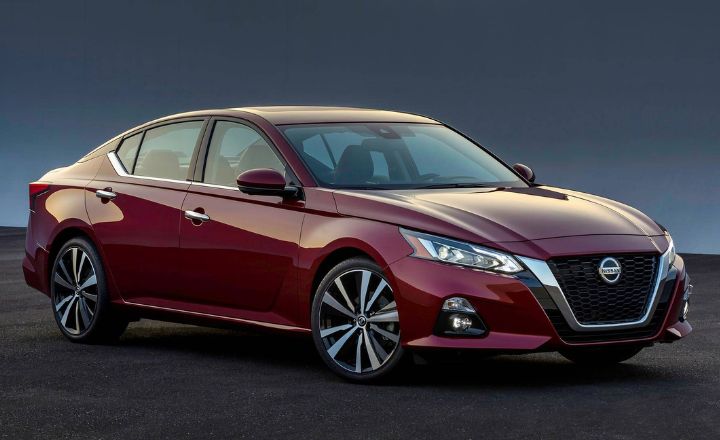The Nissan Altima has been a mainstay in the midsize sedan market for decades, offering reliability, comfort, and style to countless drivers. Every Nissan has introduced new features, designs, and performance enhancements to the Altima lineup.
Not all model years are created equal. We delve into the best & worst Nissan Altima years to help you navigate the sea of options when considering purchasing or upgrading your beloved sedan.
The Nissan Altima has undergone significant transformations in design, technology, and driving dynamics. Understanding which years shine brightest and which ones fall short can make all the difference in your ownership experience.
So we journey through the best Nissan Altima years and Nissan Altima years to avoid in various generations and uncover which model years stand out from the crowd.
Nissan Altima Generations:
The Nissan Altima has seen several generations since its debut in 1992. It set a new standard for midsize sedans with its combination of power, efficiency, and style. This marked Nissan’s entry into the competitive U.S. midsize sedan market and has since become a popular choice for those seeking a reliable and stylish vehicle.
Each new generation of the Altima continues to evolve, offering innovative features and design updates to meet the changing needs of drivers. Below is a table of all Nissan Altima Generations for an overview from 2002 to the present year.
| Generations | Years |
|---|---|
| 3rd Generation | 2002 to 2006 |
| 4th Generation | 2007 to 2012 |
| 5th Generation | 2013 to 2018 |
| 6th Generation | 2019 to Present |
Nissan Altima Best, Neutral, and Worst Years:
Considering the Nissan Altima’s Best, Neutral, and Worst Years, it is important to consider a variety of factors, including:
- Owner-reported reliability surveys can provide valuable insights into the performance and longevity of different model years.
- Annual maintenance costs, safety ratings, Consumer Reports reliability scores and owner satisfaction scores are crucial in determining the overall quality of each year’s model.
- NHTSA recalls, investigations, and complaints should also be considered, as they can highlight potential safety or performance issues with specific model years.
- Edmunds owner ratings, J.D. Power owner ratings, Kelley Blue Book (KBB) owner ratings, VehicleHistory owner ratings, and Cars.com owner ratings can offer comprehensive perspectives on the overall satisfaction and performance of different Nissan Altima models over the years.
Below is a graph of Nissan Altima’s performance over the years. This graph combines ratings from the source above.
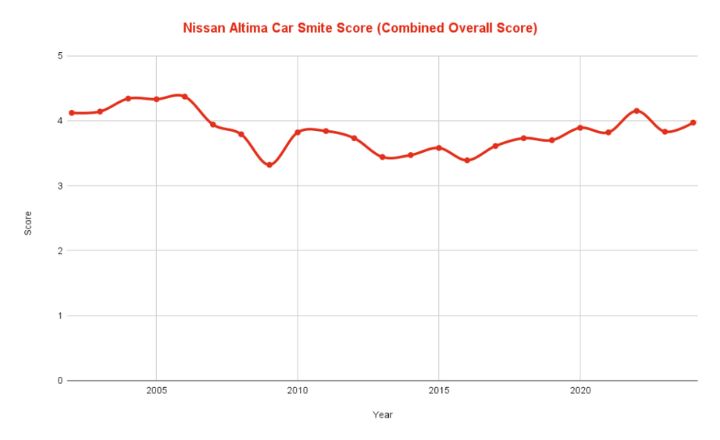
Based on the comprehensive data and analysis, we will provide the table in which we categorize the Nissan Altima model years into best, neutral, and worst years.
| Generations | Best Years | Neutral Years | Worst Years |
|---|---|---|---|
| 3rd Generation | 2004 | 2005, 2006 | 2002, 2003 |
| 4th Generation | 2010, 2011 2012 | 2007 | 2008, 2009 |
| 5th Generation | 2017, 2018 | 2016 | 2013, 2014, 2015 |
| 6th Generation | 2021, 2022 2023, 2024 | N/A | 2019, 2020 |
Best & Worst Nissan Altima Years in 3rd Generation (2002-2006):
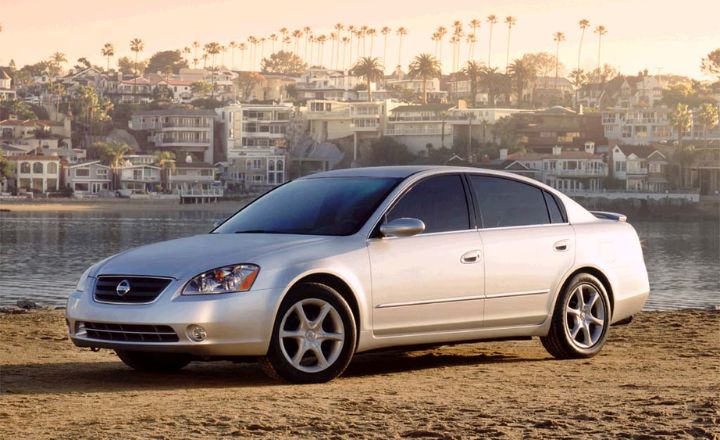
The 3rd Generation Nissan Altima, which debuted in 2002, saw significant changes in size, power, and aesthetics compared to its predecessors. The 2004 model is often considered the best year for Nissan Altima due to its refined design and improved performance. It featured a more powerful engine and updated styling, making it a popular choice among consumers.
The 2002 and 2003 models are often considered the worst years to avoid in this Generation. These earlier models had more reliability issues and fewer features than later years.
The Best Year For Nissan Altima: 2004
The 2004 Nissan Altima is widely regarded as one of the best years for this model. The choice of either a 2.5L QR25DE I4 or a 3.5L VQ35DE V6 engine offered a balance between fuel efficiency and power. The four-cylinder version boasted approximately 20 city and 27 highway mpg, while the V6 provided 18 city and 24 highway mpg.
The various trim levels, including the base 2.5, the 2.5 S, and the more luxurious 3.5 SE and 3.5 SL, catered to different preferences with features such as a Bose premium audio system, leather seats (you can add seat massager), and a power sunroof in higher trims. Come on. The standard safety features of this model year include dual front airbags, side airbags, and anti-lock brakes in trims.
Some owners reported engine performance and structural integrity issues, but 3rd Generation 2004 was the best year for Nissan Altima overall.
The Neutral Years: 2005, 2006
From 2005 to 2006, the Nissan Altimas continued to face issues with their engine and transmission options, carrying over problems from the previous model year.
These included stalling and oil consumption in the engines, leading to a recall in 2006 due to safety concerns. There were complaints about premature failures in the automatic CVT transmissions, causing frustration for many owners.
Structural concerns also plagued these models, with reports of rust and corrosion, particularly under the vehicle and around the floorboard.
These issues raised questions about the long-term durability of the vehicles and prompted some owners to seek solutions for these structural weaknesses.
The Worst Years: 2008, 2009
The 2008 and 2009 Nissan Altimas faced various reliability issues, particularly with their CVT transmissions. Many owners reported widespread failures and costly repairs associated with this component. Engine problems such as excessive oil consumption and poor performance were commonly cited, leading to frustration among owners.
In 2009, Altima experienced steering wheel lock failures, which resulted in a class-action lawsuit due to safety concerns. Defective airbags and electrical system malfunctions were also persistent issues during these years. Structural concerns like floor pan and subframe rusting compromised the car’s integrity.
Multiple recalls were issued to address suspension issues and faulty airbag sensors, further highlighting the extent of the reliability challenges faced by these models during this timeframe.
Best & Worst Nissan Altima Years in 5th Generation (2013-2018)
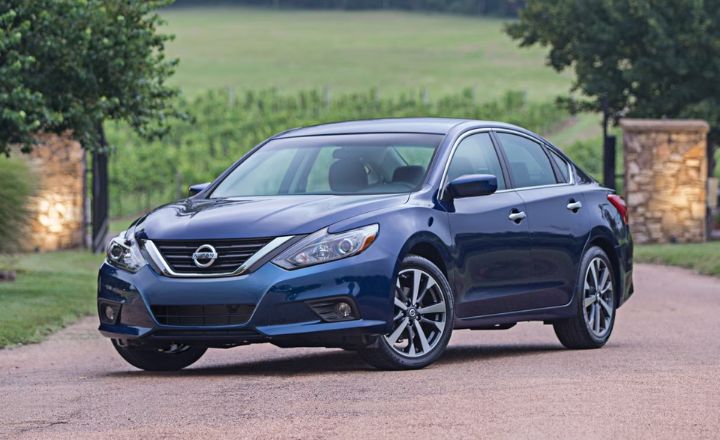
The 5th Generation Nissan Altima, which debuted in 2013, brought significant improvements in fuel efficiency and a modern design. Among the model years within this Generation, the 2017 and 2018 versions are often regarded as the best due to their refined features, updated technology, and overall reliability.
The 2013, 2014, and 2015 model years are often considered less reliable and may be best avoided. These earlier iterations of the 5th Generation Altima have been associated with more frequent mechanical problems and lower overall satisfaction among owners.
The Best Years For Nissan Altima: 2017, 2018
The 2017 and 2018 Nissan Altima models are widely regarded as some of the best years for the vehicle. These models have received praise for their reliability, with fewer recalls and high owner satisfaction. They offer a choice between two engine options, the 2.5l I4 and the 3.5l V6, paired with Xtronic CVT transmission.
The four-cylinder models boast impressive fuel economy, with an EPA-estimated 27 city and 38 highway mpg, while the V6 models offer a respectable 22 city and 32 highway mpg.
During these model years, they introduced advanced safety features under the Nissan Safety Shield umbrella, earning them a Top Safety Pick from the IIHS. With various trim levels available, including the 2.5, 2.5 S, 2.5 SR, 2.5 SV, 2.5 SL, and 3.5 SL, these years of the Nissan Altima provide a range of options to suit different preferences and needs.
The combination of reliability, fuel efficiency, safety features, and trim level choices make the 2017 and 2018 Nissan Altima excellent for potential buyers in the midsize sedan market.
The Neutral Years: 2016
The 2016 Altima represents a period of relative stability in terms of powertrain and technology, with subsequent years maintaining similar features. The mid-generation refresh introduced updated styling and the addition of the sporty SR trim, providing consumers with more options.
Issues with CVT, air conditioning, and electronic systems have been reported, although not as severe as in the worst years. The 2016 Altima can be considered to have a neutral status regarding reliability and performance.
While some drivers have experienced problems with the CVT, air conditioning, and electronic systems in the 2016 Altima, these complaints are not as widespread or severe as in other model years. The introduction of the sporty SR trim and updated styling during this period provided a refreshing option for consumers looking for a bit more flair in their vehicles.
The Worst Years: 2013, 2014, 2015
The 2013-2015 Nissan Altima might not be cut due to many issues reported by NHTSA owners. The most pressing problem revolves around continuous variable transmission (CVT) issues, with numerous complaints about failure, shuddering, and vibration. This critical component’s malfunction can lead to costly repairs and safety concerns for drivers.
These model years have been plagued by multiple recalls for essential parts such as the secondary hood latch and Occupant Classification System (OCS), posing potential hazards for drivers and passengers.
The 2013 Altima has garnered complaints regarding exterior accessories, braking system malfunctions, power steering problems, and suspension issues. These widespread grievances paint a troubling picture of the reliability and performance of these particular model years. You can avoid these years in this Generation because these are Nissan Altima years to avoid.
Best & Worst Nissan Altima Years in 6th Generation (2019-Present)
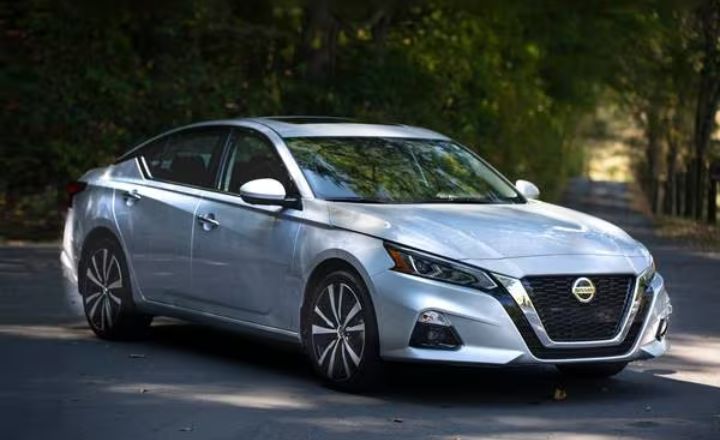
The 6th Generation of Nissan Altima, 2021, 2022, 2023, and 2024, are the best years for Nissan Altima to stand out as one of the best overall performers and innovators.
Some critics and consumers have pointed out the 2019 and 2020 Nissan Altima years to avoid. While still offering many desirable features, some customers have raised concerns about the continuously variable transmission (CVT) in this model year.
Nissan Altima Best Years: 2021, 2022, 2023, 2024
The 2021 to 2024 Nissan Altima has emerged as a standout choice for automotive enthusiasts seeking performance and reliability. With its standard 2.5L I4 engine delivering an impressive 188hp and the option of the VC-Turbo 2.0L KR20DDET I4 engine generating a robust 248hp, drivers can find the perfect balance between power and efficiency.
The availability of an AWD option exclusively with the 2.5L engine further enhances traction, making it an ideal companion for varying road conditions.
Nissan’s dedication to safety is evident in including standard features like automatic emergency braking, pedestrian detection, and rear automatic braking through its Safety Shield 360 system. Beyond its mechanical prowess, the Altima boasts advanced technology and comfort across its trim levels from S to the SV, SR, SL, and premium Platinum, appealing to many drivers’ needs and preferences.
These model years represent what Nissan Altima offers, combining sleek design elements, cutting-edge safety features, and powerful yet efficient engines.
As consumers seek vehicles that encapsulate modernity without compromising performance or safety standards, it’s clear that 2021-2024 are the best years for Nissan Altima of this Generation.
Nissan Altima Years To Avoid: 2019, 2020
The 2019 and 2020 Nissan Altima models faced several significant issues that potential buyers should know. These models experienced problems with the ProPILOT Assist system, leading to unexpected steering inputs, which could pose a safety risk.
The VC-Turbo engine had inconsistent performance and a shuddering sensation, which may affect the driving experience.
Recalls were issued for backup camera settings and fuel pump failure in these model years, indicating potential reliability concerns. The 2020 Altima was also recalled for a hood latch issue that could cause unexpected hood opening while driving. Considering these issues, these years are avoiding years.
What Are Some Typical Problems With The Nissan Altima Models?
The Nissan Altima has been known to experience some common issues across its various models.
- Engine Faults: Some Nissan Altima models have been reported to experience engine faults, such as oil consumption issues and premature wear of internal components.
- Transmission Issues: Certain Altima models have complained about transmission problems, including jerking or slipping during gear shifts and failure of the CVT transmission.
- Steering Wheel Problems: Some owners have noted issues with the steering wheel, including excessive vibration, clunking noises, and difficulty maintaining alignment.
- Interior Accessories Problems: Some common issues with the interior accessories of Nissan Altima models include malfunctioning infotainment systems, faulty power windows, and problematic air conditioning units.
- Body and Paint Issues: Many Nissan Altima owners have reported paint chipping, peeling, and fading, as well as body panel misalignments and rust problems in some regions of the vehicle.
These issues are common in other Nissan models like the Nissan Titan, Nissan Murano, and more SUVs.
Nissan Altima Reliability:
The Nissan Altima has a reputation for being a reliable car. Many owners report that the Altima is durable and requires minimal maintenance over time. With proper care and regular servicing, the Altima can easily reach high mileage without major issues.
Like any car model, there have been some reports of common problems with certain years or trims of the Nissan Altima. It’s important to research specific model years and read reviews from other owners to get a better understanding of potential reliability concerns.
Nissan Altima Average Resale Values:
The average resale value of a Nissan Altima varies depending on factors(I mentioned above). Below is a graph of Average Resale Values:
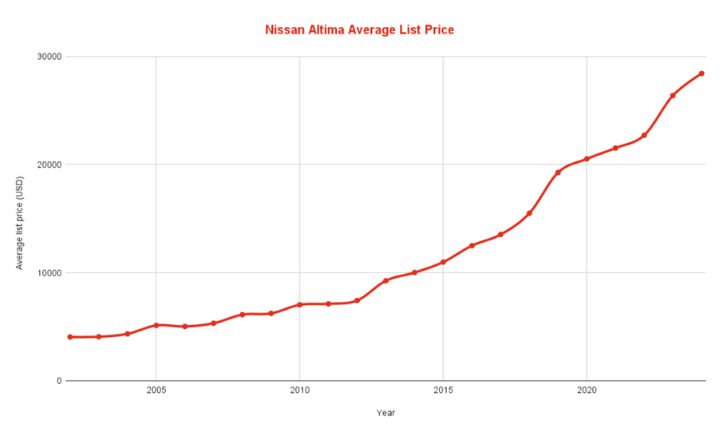
Final Words:
The Nissan Altima has had its ups and downs over the years, with some models standing out as better options than others. The best years for Nissan Altima include 2004, 2010, 2011, 2012, 2017, 2018, 2021, 2022, 2023, and 2024, offering reliability, performance, and safety features.
The worst years, such as 2002, 2003, 2008, 2009, 2013, 2014, 2015, 2019, and 2020, have been plagued by transmission issues and poor build quality. It’s important for potential buyers to thoroughly research each model year before making a purchase decision.
FAQ’s:
What Year Nissan Altima to Avoid?
The Nissan Altima models to avoid are the 2013 and 2014 versions. These years have been reported to have issues with their continuously variable transmission (CVT), which can lead to costly repairs and potential safety concerns.
ARE NISSAN ALTIMAS GOOD CARS?
Yes, Nissan Altimas are generally considered to be good cars. They offer a comfortable ride, spacious interior, and good fuel efficiency. The Altima also has a strong reputation for reliability and comes with a range of advanced safety features.

